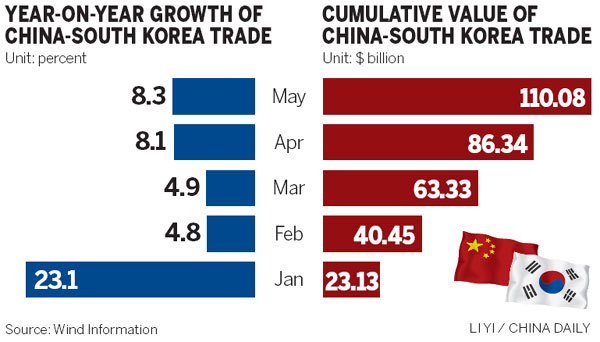'Move faster' on South Korean trade pact
Updated: 2013-06-20 07:23
By Li Jiabao in Weihai, Shandong (China Daily)
|
||||||||
Agreement should boost bilateral trade, valued at $256.3b last year
A free trade agreement between China and South Korea should be a top priority for both sides, and can serve as a boost to the accelerated economic integration of East Asia.
That's according to senior officials who attended a trade seminar in Weihai, Shandong province, on Wednesday.
Yu Jianhua, China's deputy international trade negotiator at the Ministry of Commerce, told delegates that despite the emerging free trade pacts across the Asia-Pacific region, "both China and South Korea should prioritize the creation of a bilateral FTA".
China and South Korea launched the FTA talks in May 2012 after eight years of preparation and research.
Five rounds of talks have been held and the sixth round is expected to be held in South Korea in July.
Yu added that effective communication and control of differences will bring the talks to a successful conclusion, despite concerns on potential competition in some industries.
"We must advance and conclude all the negotiations as soon as possible to the benefit of both sides," Yu said.
China is South Korea's largest trading partner and bilateral trade between the two sides was worth $256.3 billion in 2012, a 4.4 percent year-on-year increase, according to the commerce ministry.
"The bilateral FTA will liberalize trade and investment and China-South Korea trade will achieve its target of $300 billion before 2015 and $600 billion by 2030, becoming an important trade tie for the world," said Zhao Jinping, a researcher at the Development Research Center of the State Council.
Zhang Yunling, director of International Studies at the Chinese Academy of Social Sciences, said that the past decade has been a golden era for bilateral trade growth between China and South Korea, despite China's long-term trade deficit with South Korea.
He said trade will grow at a moderate pace in the future with more focus on quality.
"The FTA is a real boost and an example of economic integration in East Asia," he said.
"Success in the bilateral trade pact will encourage the China-Japan-South Korea FTA and also the Regional Comprehensive Economic Partnership," said Zhang.
"But I think the bilateral FTA's progress has been too slow and the two countries should sign the pact as soon as possible, as economic ties between the countries are undergoing great changes, including slowed trade growth, a transformation of South Korean enterprises in China amid rising costs, and narrowing gaps in technology and products."
Zhang added that the two countries should prioritize the FTA at the highest level, and it should cover not only trade in goods and services but also investment facilitation.
Shi Yuanhua, a professor at Fudan University in Shanghai, added that after eight years of talks, both sides are clear about the pros and cons of the agreement.
"The top leaders of both countries should focus on medium- and long-term reward rather than short-term differences," Shi added.
South Korean President Park Geun-hye will visit China from June 27 to 30 and is expected to comment on the FTA's progress, including details on intellectual property protection, the investment environment and other trade issues, according to Park Dae-shik, vice-president of the Korea Economic Research Institute.
He agreed there should be more decisive decisions taken by both sides.
Sun Yuanjiang, deputy director-general of the commerce ministry's international department, added: "I hope Park's visit will achieve a breakthrough in the negotiations.
"The bilateral pact is a key knot to the economic integration of East Asia and both sides attached great importance to it."
Shi described the FTA as a landmark for the countries, which would help deepen economic ties, and said that South Korean trade policies with China and the United States will become imbalanced, if a trade pact takes too long to complete.
Shin Bong-kil, secretary-general of the Trilateral Cooperation Secretariat, told China Daily on Monday that South Korea will not join the Trans-Pacific Partnership Agreement at present, despite an invitation from the US.
lijiabao@chinadaily.com.cn

(China Daily USA 06/20/2013 page13)

 Michelle lays roses at site along Berlin Wall
Michelle lays roses at site along Berlin Wall
 Historic space lecture in Tiangong-1 commences
Historic space lecture in Tiangong-1 commences
 'Sopranos' Star James Gandolfini dead at 51
'Sopranos' Star James Gandolfini dead at 51
 UN: Number of refugees hits 18-year high
UN: Number of refugees hits 18-year high
 Slide: Jet exercises from aircraft carrier
Slide: Jet exercises from aircraft carrier
 Talks establish fishery hotline
Talks establish fishery hotline
 Foreign buyers eye Chinese drones
Foreign buyers eye Chinese drones
 UN chief hails China's peacekeepers
UN chief hails China's peacekeepers
Most Viewed
Editor's Picks

|

|

|

|

|

|
Today's Top News
Shenzhou X astronaut gives lecture today
US told to reassess duties on Chinese paper
Chinese seek greater share of satellite market
Russia rejects Obama's nuke cut proposal
US immigration bill sees Senate breakthrough
Brazilian cities revoke fare hikes
Moody's warns on China's local govt debt
Air quality in major cities drops in May
US Weekly

|

|







